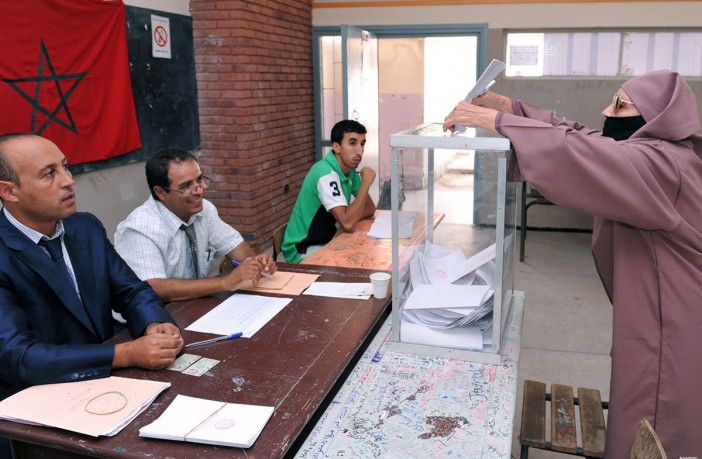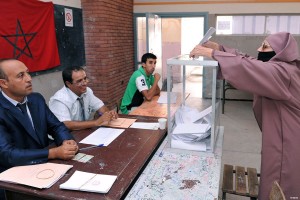Middle East Monitor
by Abderrahim Chalfaouat
In the context of the struggle between the waves of revolution and counter-revolution in the MENA region Morocco witnessed local and regional elections this week, the first after the constitution amendments of 2011. The elections, held on 4 September, are also the first since 2011 in which political actors agreed on a final version of the regionalisation project, whereby each of the country’s 12 regions will be led by an elected council with wide economic, human, infrastructural, environmental and cultural development capacities.
In a sense, the 2015 elections mark another step in the post-Arab spring Morocco and another opportunity to examine the outcome of the country’s “reform under stability” paradigm. The lesson for Morocco is that the potential failure of the paradigm will immediately tarnish the whole diplomatic, political and reform effort that started in 2011.
In the run up to the elections, Morocco feared that foreign pressure would restrict the participation of Islamists in a free and fair way. That pressure was eventually diminished through a tandem of internal and external factors; while the former manifested itself in governmental reforms, the latter included the change in the Saudi leadership, the eruption of the war in Yemen and the signing of the Iran nuclear deal. These events pushed local actors to shift the focus away from curbing the outcome of the Arab Spring, especially since attempts to smother the post-Arab Spring nascent democracies has generated chaos across the region. The difficult lesson of the past four years has been that it is despotism that threatens stability in the region, not respecting public will.
Around 1.1 million new voters registered on Morocco’s electoral lists last August, 46 per cent of whom were women. Certainly, the widespread discussions of women’s freedom and the female quota in election lists have increased gender visibility in Moroccan politics. A Ministry of Interior press release revealed that 70 per cent of the new voters applied online while the rest approached administrative offices directly. The lesson from this is that the recent elections exemplified a further effect of the Internet in the democratisation process in Morocco, as well as indicating the fact that less bureaucracy encourages more political involvement.
In the final results, the Party of Authenticity and Modernity (PAM) ranked first with 6,655 local seats. The PAM was challenged in the 2011 protests as a symbol of despotism, especially since it was founded by Fouad Ali Elhimma, an advisor to the King. Yet, administrative intervention was quite absent. This year, the PAM has focused significantly on rural areas; as a consequence, they were able to reserve around 700 rural seats before the polling day since their candidates had no opponents.
The administration has also increasingly withdrawn from fabricating election results, recognising both the change in people’s awareness of its pre-Arab Spring practices and the fact that the Arab Spring spirit has not yet waned in the country. More public activism and public policy surveillance mean more democratisation.
Nevertheless, electoral corruption has persisted and the discourse of reform has faced two key obstacles, namely illiteracy and poverty. For example, the PAM was accused of receiving campaign money from drug-barons, especially in the north of the country. Also, some administration staff were accused of helping PAM candidates, though obliquely. For instance, the minister of Higher Education was invited to be a PAM candidate by a local administration representative, who failed to recognise that he was talking to a PJD minister. It seems the representative – who was arrested immediately – had been ordered to recruit to PAM any eligible person he came across in that rural region.
On the issue of poverty, some young election campaigners, for instance, reportedly worked for opposition parties during their campaigns but promised to vote for government parties; their only reason for doing so being poverty. Especially for the PJD, who relied on the efforts of its own members and adherents, payments did not encourage youngsters to work for it since they needed money at the beginning of a new academic year. Both the government and civil society need to learn that democratisation necessitates fighting the illiteracy and poverty upon which corruption and despotism feed.
According to official statistics, the ballot turnout rose from 52.4 per cent in 2009 to 53.67 per cent in 2015. The government-leading Islamist PJD party ranked third, tripling local council seats. They, on the other hand, ranked first in the number of regional seats. Voters for the PJD, or the government coalition generally, range from citizens tired of corruption and despotism, those tired of the discourse of election boycotters, those who are growing satisfied with previous local councils’ achievements in such cities as Kenitra or Tetuan and those who increasingly support the government’s reforms. The lesson here is that more reform will push more Moroccans to leave the position of silent majority and take a stand.
Another takeaway from the elections is that the PJD needs to upgrade its political discourse from that of suffering to that of political readiness. Both voters and election boycotters need to believe that the long-standing, deeply rooted corruption that characterised many local councils can be defeated. The outcome of these councils’ dishonesty and inefficiency is clear in the low quality of socioeconomic infrastructure. Both those who support reform or boycott voting because they still believe in the inadequacy of what has been achieved so far need to see election slogans and programmes meaningfully transformed into better roads and stronger bridges, better water for drinking, more electricity, more schools, closer hospitals and cleaner air, more youth houses and public libraries, more investments and less bureaucracy.
A final thing to learn is that the elections in Morocco project a ray of light to the rest of the MENA region and the message that slow but steady reform persists despite the pitfalls of counter-revolutionary movements. That is why, Morocco, and the PJD more particularly, have been congratulated by the leadership of Palestinian resistance movement Hamas and the Tunisian Ennahda party. This tiny glimmer of hope must be nurtured by avoiding odd coalitions in local and regional councils, as well as by extending the limits of reform to make every new change another brick in the wall of democratisation that is slowly but surely being built.
Abderrahim Chalfaouat is a Morocco-based researcher in media and MENA politics.








